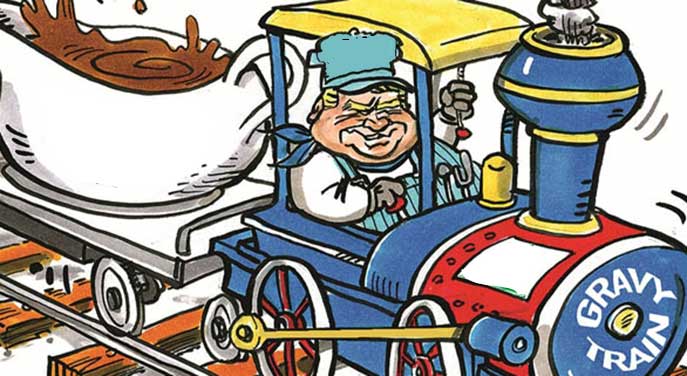 Inflation in Canada is the highest it’s been since the 1990s, but the reason behind the rising cost of living is different this time and rich corporations are part of the story.
Inflation in Canada is the highest it’s been since the 1990s, but the reason behind the rising cost of living is different this time and rich corporations are part of the story.
Canada hit a new all-time high in corporate profits between October and December last year – $139 billion in pre-tax profits, to be exact, according to Statistics Canada.
And the party’s still going this year: between January and March 2022, corporations made $138 billion in pre-tax profits.
Corporations’ gross profit margins have also hit a new high, reaching a record 10.9 percent in the first quarter of this year. This means that corporations are avoiding being squeezed by high input costs (like gasoline) by passing all those costs, and then some, on to consumers. They’re turning the difference into profit for themselves.
Canada’s big banks are driving a fair bit of this. In the first three months of 2022, they shattered previous profit records, but you didn’t see bank fees go down, did you?
| RELATED CONTENT |
| Thank corporations for driving job growth By Roslyn Kunin |
| The slippery ethics of paying grocery executives bonuses By Sylvain Charlebois |
| Income inequality contributes to higher rates of adolescent depression By Keri Sweetman |
Russia’s war on Ukraine has driven global oil prices through the roof and Canada’s oil and gas extraction industry is enjoying its best three months ever in pre-tax profits, which are already at $12.6 billion since the start of this year.
We all know that higher prices aren’t limited to the gas pump. There’s sticker shock at the grocery store, too, as the cost of things like meat and veggies are on the rise, with no sign of letting up any time soon.
Guess what? Grocery stores booked $7.3 billion in pre-tax profit in 2021. That’s more than double what they were clearing the year before the pandemic.
Economists often tell complex stories about the cause of inflation, but sometimes it’s straightforward: large corporations with the ability to set prices can ratchet those prices up to pad their profit margins.
That is what is happening in some key high-price sectors in Canada right now. So what can we do about it? Take away the incentive to ride the gravy train: tax large corporations making excess profits and use the revenues for public services that make life more affordable for everyone.
Corporations always threaten to pass tax increases on to consumers, but when corporate taxes dropped like a stone in the early-2000s, none of that got passed along in lower prices.
In its recent budget, the federal government announced measures to move in that very direction. It added an excess profits tax to banks and insurance companies that recorded more than $1 billion in taxable income in 2021. It also levied an additional 1.5 percent tax for those same companies on profits over $100 million going forward.
Great first step, but it’s not only banks booking record profits.
According to data from the Globe and Mail, 51 public companies in Canada made more than $1 billion in profits in 2021. Banks and insurance companies account for 20 percent of them. What about the rest? The federal government is leaving a pile of money on the table as the cost of living continues to soar.
Almost a quarter of those companies are in the oil and gas sector – and making record-high profits in 2022. Tax them.
The same could be said of grocery store conglomerates and high-tech companies that have been doing extremely well during the pandemic, despite the shock to the rest of the economy. Tax them.
Canada should put those companies on a level playing field with other high-profit corporations. It’s only fair.
Canada could dedicate those tax revenues to something helpful and practical, such as sending income transfers to those who need it as the cost of living outpaces wage increases.
That’s a lesson we should take away from the early months of the pandemic when working people lost their jobs, and the Employment Insurance system proved to be utterly incapable of withstanding such a shock. The federal government offset that shock with the Canada Emergency Response Benefit.
Let’s do it again. Let’s create an anti-inflation transfer to buffer the people who need it most from the latest shock to the system – inflation. Taxing the corporate inflation profit gravy train can help make it happen.
David Macdonald is senior economist with the Canadian Centre for Policy Alternatives, a non-partisan research institute.
David is a Troy Media contributor. For interview requests, click here.
The opinions expressed by our columnists and contributors are theirs alone and do not inherently or expressly reflect the views of our publication.
© Troy Media
Troy Media is an editorial content provider to media outlets and its own hosted community news outlets across Canada.


